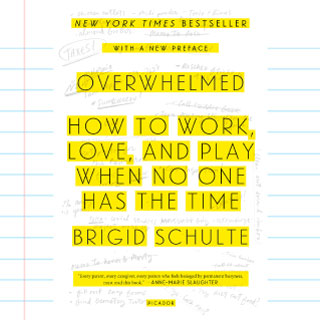The Longest Shortest Time
EPISODE #213: It’s A Real Mother, Part 5: Now What?
A couple years ago we did a big series called It’s a Real Mother about discrimination against working moms. Pulitzer prize-winning journalist and mother of two Brigid Schulte is back with an update on what’s gotten worse and what’s gotten better for working moms in the U.S. today.

Brigid’s book, Overwhelmed

Brigid Schulte (credit: Simone McPhail)
We heard from so many of you after our series came out about the challenges you faced in your own workplaces. But we also heard some promising stories.
Tune in to hear from one listener who used what she learned in our original series to move the needle in a big way for parents at her workplace.
Want more equity at your job AND at home?
Brigid Schulte is running experiments at the Better Life Lab to help take the load off of any parent carrying the bulk of the load at home. You can be an beta tester!
The Gottman Institute’s Who Does What list is also a great place to get started.
Listen to The Double Shift podcast, made by friend-of-the-show Katherine Goldstein.
Wanna get fired up about gender inequity in the American workplace?
This is the study that used fake resumes to find out if there’s a motherhood penalty (Shelley Correll, Stephen Bernard; The American Journal of Sociology). The results motivated us to do this series in the first place!
Here’s a report looking at the fatherhood bonus vs the motherhood penalty (Michelle J. Budig; Third Way NEXT Initiative).
This is a summary of a study on the gender wage gap broken out by race and ethnicity (Ariane Hegewisch, Heidi Hartmann; Institute For Women’s Policy Research).
For an overview on the history of discrimination against mothers in the workplace, read Amy Westervelt’s insightful reporting in Forget Having It All: How America Messed Up Motherhood—and How to Fix It. Amy also wrote a list for us, with her top 8 books on the intersection of motherhood, misogyny, and feminism.
And for an investigation into inequities in the home between mothers and fathers, try psychologist Darcy Lockman’s All the Rage: Mothers, Fathers, and the Myth of Equal Partnership.
But it’s not all doom and gloom
💯🚨💯🚨The Washington Post just changed it’s parental leave policy: Now each parent gets 20 weeks — five months — of PAID leave. Yet another reason the Post is such a great place to work…
— Ashley Parker (@AshleyRParker) October 17, 2019
In the journalism industry, the Washington Post just started offering 20 weeks of paid parental leave. Laura Hazard Owen at Nieman Lab looked into what other U.S. news outlets offer new parents.
It’s A Real Mother
Discrimination against working moms is a real mother of a problem. But you can help. Listen to all the episodes of our series and find out what YOU can do—no matter who you are—here.
If you’ve experienced discrimination in the workplace as a pregnant person or parent and need help, we’ve got resources for you.
The Longest Shortest Time may earn a small commission from products linked on this site. Using our affiliate links helps support our work.